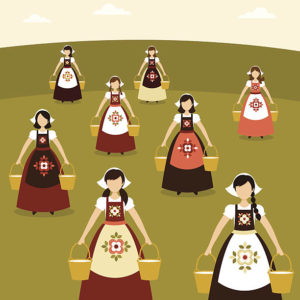On the eighth day of Christmas my true love gave to me… Eight maids a-milking.

If you do some intensive research (or a bit of googling on a mobile phone), you’ll find several different ideas about why there are eight maids a-milking in this song, and what it may mean. Then you have a choice. You could explore all these speculative interpretations and maybe write a thesis about them, or just keep it simple, take a breath and well, sing it if you want.
If you come to the world of organ donation from the sharp end, through organ failure, yours, or in someone very close to you, you’ll have a similar choice. You are likely to learn a lot, very quickly. How blood samples give clues to how your body is functioning, and what it might mean if certain key numbers are higher or lower than your own average. Things will be explained, even drawn, by consultants and surgeons to help us understand what’s going on, what’s working or not, what needs to be done to fix it.
You may learn about a range of “procedures”, other medical interventions that are not always as invasive as transplants. Biopsies, and others with complex or descriptive names. Sometimes the name describes the procedure, like percutaneous transhepatic cholangiogram (eh? – look it up if you must). Sometimes it is named after the person who first used the technique, like the Kasia procedure named after Morio Kasai, a Japanese paediatric surgeon working on biliary atresia.
You’ll learn about a variety of medications too, like tacrolimus, prednisolone and ursodeoxycholic acid, immunosuppressants and steroids and some to ease the side effects of others.
It can all seem very complicated and daunting as you sit at the edge of the hospital bed about to be discharged after a transplant, sent home with a green plastic bag or two, or three, of medication to keep you going until your local chemist, or the specialist couriers can start your regular supply. For those who need to know, it soon becomes familiar, and the experts won’t be far away.
There’s plenty of opportunity for new learning if you want it. Groups such as CLDF, Kidney Care UK and The British Heart Foundation, provide excellent resources, plain language “road maps” to help recipients and their families and friends find their way in this new world. Some even buy textbooks to take them deeper, and others begin careers in medicine, bringing the benefits of their personal experience and empathy to the care of others.
But, as knowledgeable as you and your loved ones may become, that’s not the reason for a transplant. Not to become a medical expert, but to get back to enjoying the everyday, simple things that make our lives so rich. And the intensity of a transplant can cast a new light over those simplest of things. Like the chance to stand up from the sofa and walk down a street where before your body wouldn’t let you. Or to go for a walk and feel cold rain on your face, just because you can. Or take a deep breath all the way to the bottom of your working lungs and know that breath, each breath, will give you strength. Or sit on a beach, “…in the freezing, warm, windy, cold, rainy or whatever, and just sit there and look at the scenery and things that you’d never really think a 17-year-old would enjoy. Just being there means a lot more because I know I’ve chosen it for myself, and I know that I have fought to get here to where I can just enjoy things and actually be alive and live in the world.”
Keep it simple. Have the conversation about organ donation with somebody else, and make sure your family know what you would want should that moment ever come. It could lead to a new career for someone in complex medicine. Or just give someone the chance to sit on a beach again, even in the rain, and breathe.
